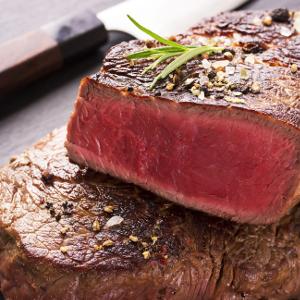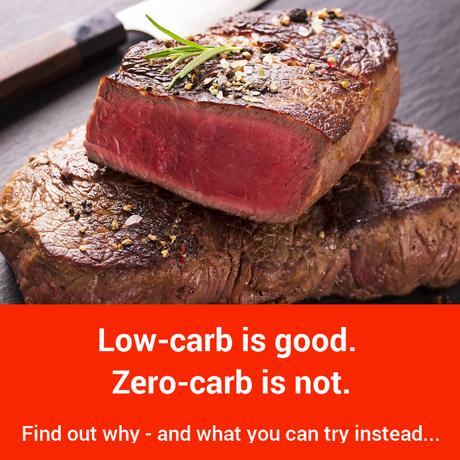 You already know about the benefits of a low-carb diet. Some of us are tempted to go even further.
You already know about the benefits of a low-carb diet. Some of us are tempted to go even further.
Cutting down carbs to 20-30g a day makes you lose weight quickly and painlessly.
So, if you cut your carbs down to zero, it will be even better - right?
Wrong. Here's why.
Very few foods are genuinely zero-carb
The only foods that are genuinely 100% zero-carb are fats and animal proteins.
Zero-carb limits your food choices to a ridiculous degree. You are left with red meat, fish, poultry, butter, vegetable oils... That's about it!
Low-carb diets exclude foods like grains and fruit. This is sensible. The high sugar content of these foods negates their nutritional benefits.
There are plenty of low-carb options to add variety - green leafy vegetables, salad vegetables, dairy, seeds and nuts. Going zero-carb means abandoning them all.
Zero-carb is extremely boring
What could you eat on a zero-carb diet?
Bulletproof coffee for breakfast. Or maybe bacon. Steak for lunch, baked fish for dinner - no sides, no sauces.
Does this sound appetizing? How long do you think you would last?
It will get extremely boring quickly. Most likely, you will just give up after a few days.
20g of carbs a day are enough to add joy to your meals. Salads, cooked vegetables, cheese and cream jazz up your protein dishes. Berries, nuts, seeds and dairy make lovely low-carb desserts.
Zero-carb would not provide enough vitamins
Red meat and fish contain plenty of vitamins A, B and D. But they do not include all the vitamins and minerals you need.
For example, vitamin C comes from plant sources only. Contrary to the popular belief, it doesn't have to be from fruit. There are plenty of low-carb sources of vitamin C - like bell peppers (yellow ones contain twice as much vitamin C as oranges), green leafy veggies, broccoli and strawberries.
If you spend your 20g a day wisely, you can get the full spectrum of micronutrients from low-carb foods.
Cutting your carbs down to zero will result in deficiencies. You would need supplements to support your diet. And supplements are never as good as fresh whole foods.
Zero-carb would not provide enough fibre
Vitamins and minerals are not the only area of concern. Fibre is another essential element that you would miss on zero-carb.
Our bodies do not digest fibre, but it is needed for trouble-free digestion. If you don't get enough fibre, you are doomed to be constipated forever.
Fibre can only come from plant sources. If you are only eating meat and fats, you won't get any with your food. So again, you would need to rely on supplements - not ideal. But there are plenty of low-carb foods that are high in fibre.
Even the Northern tribes eat some carbs
Advocates of zero-carb cite the example of Eskimo and Inuit tribes who live far up North in the land of permanent winter. Agriculture is impossible so they rely on hunting as their main source of food.
But once you read up on this, you realise they are not zero-carbing. Firstly, they consume every single bit of offal from their prey. Offal is very high in vitamins (those of us who are squeamish miss a trick).
During summer periods, the Eskimo travel to stock up on supplies like berries, edible plants and wild tubers. Their diet is very low-carb - but not zero-carb.
Is there any benefit in going zero-carb?
Your body could adapt to a zero-carb regime. But the benefits are not that significant. You might lose fat at a slightly higher rate. But your chances of failure would increase dramatically. So it's not worth it overall.
20g a day was originally devised by Dr Atkins as the lowest optimal level of carbs. This is now the consensus opinion amongst other low-carb diet experts. 20g is low enough to induce nutritional ketosis, but high enough to allow meals that are joyful, nutritious and healthy.
What about Dukan?
Dukan is a low-carb, low-fat diet that includes zero-carb protein-only days. That's a slightly different scenario. The diet is carefully calibrated to do zero-carb only for very short periods of time. It is also supported by oat bran for fibre and vitamins.
Some people get great results on Dukan. But in our opinion, a low-carb high-fat diet like Keto is healthier and easier.
Is there another way to speed up your low-carb diet?
If you really want to go hard core, add intermittent fasting to your low-carb diet.
It works best once you are fully Keto-adapted - so after you've been on Keto for at least one month or so. There are many ways to do intermittent fasting. When you are in ketosis, it's fairly easy to do fasting - hunger doesn't bother you.
Another obvious way to speed up your weight loss is to do more exercise. Again, it's best to wait until you are fully Keto-adapted. Low-impact cardio like jogging is harder to do without the carbs - so emphasise strength training and interval cardio for optimal results.
Don't make life harder for yourself! Get all the benefits of a low-carb diet without going to unnecessary extremes.

Author:
Updated:

